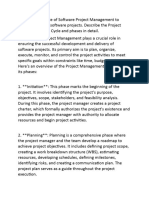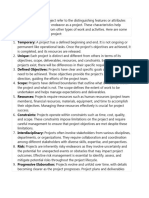0% found this document useful (0 votes)
42 views3 pagesDraft MSBP
The document discusses the importance of developing a comprehensive project management plan (PMP). It outlines 13 key factors that are crucial to include in a PMP, such as clearly defining objectives and scope, stakeholder identification and management, resource planning, developing a schedule and budget, and incorporating quality assurance and risk management. The summary emphasizes that addressing each of these factors provides structure, clarity and control, while neglecting them can lead to inefficiencies, deviations from objectives, and ultimately project failure. A well-considered PMP is essential for successful project management.
Uploaded by
hchi7171Copyright
© © All Rights Reserved
We take content rights seriously. If you suspect this is your content, claim it here.
Available Formats
Download as DOCX, PDF, TXT or read online on Scribd
0% found this document useful (0 votes)
42 views3 pagesDraft MSBP
The document discusses the importance of developing a comprehensive project management plan (PMP). It outlines 13 key factors that are crucial to include in a PMP, such as clearly defining objectives and scope, stakeholder identification and management, resource planning, developing a schedule and budget, and incorporating quality assurance and risk management. The summary emphasizes that addressing each of these factors provides structure, clarity and control, while neglecting them can lead to inefficiencies, deviations from objectives, and ultimately project failure. A well-considered PMP is essential for successful project management.
Uploaded by
hchi7171Copyright
© © All Rights Reserved
We take content rights seriously. If you suspect this is your content, claim it here.
Available Formats
Download as DOCX, PDF, TXT or read online on Scribd
/ 3
























































































